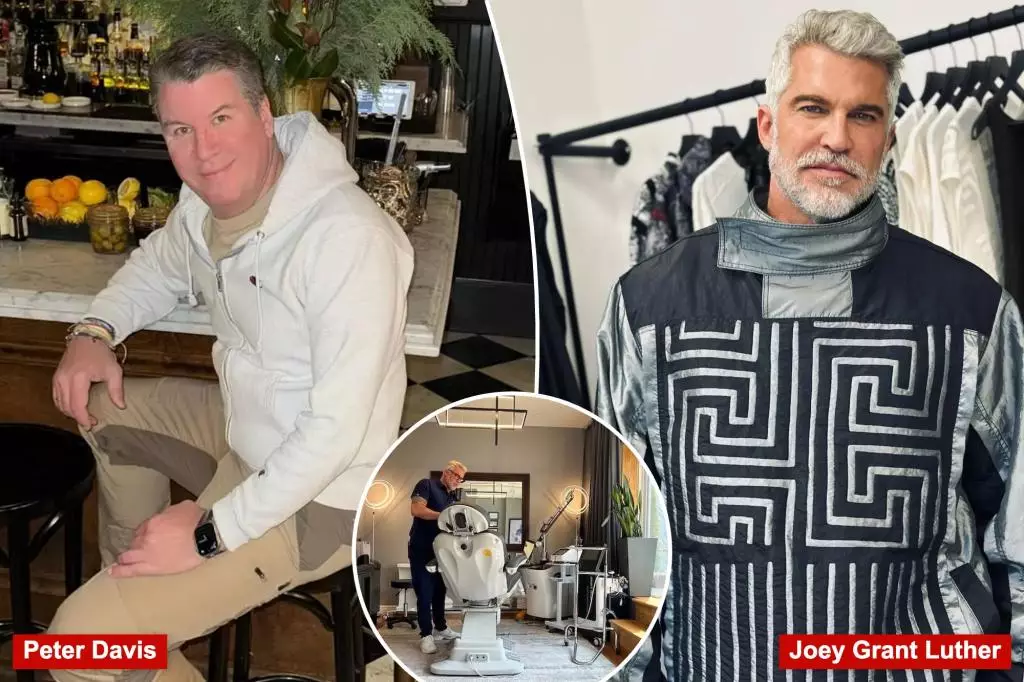The luxurious world of socialites is often fraught with the superficial pressures of maintaining a perfect image. However, recent events have cast a shadow over this glossy facade, particularly for those entangled with Joey Grant Luther, the once-renowned skin doctor now facing serious legal troubles for allegedly administering counterfeit Botox sourced from China. The revelation of Luther’s deceptive practices has sent shockwaves through the community, prompting a group of his former clients to seek solace and support through a chat group humorously dubbed “Former Lutherans.”
This incident highlights not just the risks associated with radically dynamic aesthetics but also raises pressing questions about trust, ethics, and accountability within the beauty industry.
The tale of Peter Davis, the editor-in-chief of a prominent fashion magazine, sheds light on the chilling implications of Luther’s practices. Once a follower of Luther’s aesthetic ideals, Davis now finds himself in the unsettling position of recounting his experiences as a patient of the very man whose actions have endangered so many others. “It’s a miracle I still have a face!” he quipped to Page Six, masking an underlying horror that accompanies his laughter. His story of walking away with a wrinkle-free forehead contrasts sharply with the terrifying consequences faced by others—double vision, slurred speech, and in one harrowing case, botulism necessitating hospitalization.
Davis’s retrospective acknowledgment of the red flags raised during his visits—such as the dubious location disguised as a legitimate med spa—illustrates a convergence of desperation for beauty and the blind trust placed in perceived authorities within the industry. The allure of “good deals” can obfuscate critical judgment, prompting individuals to ignore cautionary signs in their quest for aesthetic perfection.
An Industry of Illusions
What transpired at JGL Aesthetics is not merely the story of one fraudulent practitioner; it speaks volumes about the entire ecosystem surrounding cosmetic enhancement—a world often driven by trends, peer influence, and an unhealthy obsession with perfection. It is disconcerting to think that, amid the elegance of the high society, individuals felt the pressure to resort to dubious providers instead of seeking licensed professionals. The revelation that Luther was not legally authorized to administer Botox brings into sharp focus the need for greater education and awareness among consumers about the importance of qualified medical practices.
Luther’s rapport with his clientele—smooth as the Botox he administered—allowed him to peddle not just injections, but a sense of belonging and acceptance within a community often anxious about aging and appearance. His charm, however, masked a reckless willingness to exploit his patients’ vulnerabilities for personal gain.
The formation of the “Former Lutherans” group speaks to a broader movement within the community towards reclamation of trust and identity following a period of betrayal. These individuals, unsettled by their shared experiences, are not merely bonding over the trauma; they are also creating a vital space for discerning the next steps in their aesthetic journeys. With referrals to trustworthy medical professionals circulating within the group, there is hope for healing—both physically and psychologically.
Furthermore, the scandal resonates deeply within specific demographics most affected by Luther’s services, including the gay community, which comprised a substantial portion of his clientele. Sources indicate that Luther’s offerings extended beyond facial aesthetics to include procedures like penis enlargements, making the revelations even more scandalous. Such practices raise crucial conversations about ethics in sexual health and men’s body image, challenging the narrative that beauty and desirability are uniformly defined.
In the case of Joey Grant Luther, the convergence of glamour, deception, and desperation paints a troubling picture of the lengths people will go to in their pursuit of beauty. As his legal troubles unfold—along with the potential for a twenty-year prison sentence—the community is left to grapple with the implications of misplaced trust and the inherent risks of seeking enhancement through unqualified means.
Moving forward, the beauty industry must confront its ethical responsibility to prioritize patient safety and transparency. Individuals within this glittering world must be educated and vigilant, ensuring that their quest for aesthetic perfection does not come at the cost of their health and well-being. As discussions continue and awareness grows, perhaps this dark chapter in the narrative of beauty can serve as a catalyst for change, prompting more stringent regulations and fostering a culture that values safety as much as aesthetics.

